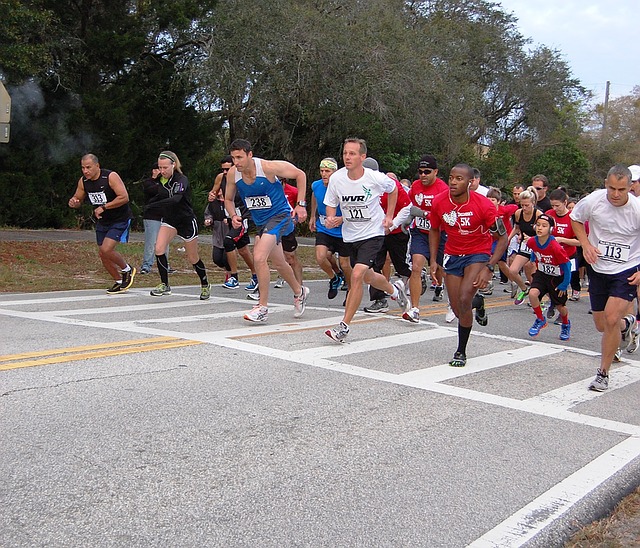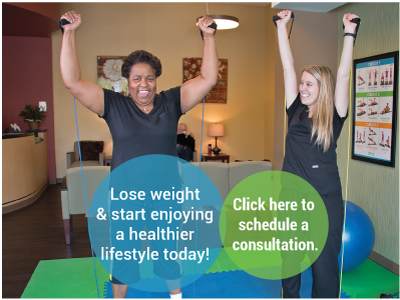Is the crisp fall air recharging your wilted summer energy? Are you reinvigorated to set fitness goals that will enable you to enjoy long-term health and keep chronic health conditions under control? If so, we applaud you and want to help out by sharing some tips that don’t have you bending over backwards to set yourself up for success!
The different LifeZones that are the keys to fitness success are nutrition, exercise, sleep, and health IQ. All four of these are affected by different factors in your life, including your:
- Job
- Habits
- Everyday Routine
- Emotional Well-being
Your goal is to be aware of the factors that impact your ability to create a lifestyle where motivation and compliance are part of your daily approach to living.
7-Week 5K Fitness Program for Beginners
The Mayo Clinic recommends a 7-week training schedule for beginners who want to run or walk a 5K (that’s 3.1 miles). The program was invented by an Olympic athlete, but it’s designed to work for everyone. If you plan to walk a 5K instead of running one, disregard the jogging recommendations and simply walk your way through this fitness program.
To begin, let’s talk about the Magic Mile, which comes into this quick fitness program in Week 3. To do a Magic Mile, warm up at your normal pace for 1 mile, then walk or run a mile at a slightly faster than average pace for you. To finish, walk or run at an easy pace for the rest of your assigned distance for the week. Try to beat the “fast mile” of your Magic Mile each week. When your 5K race day comes up, try to go a little slower (1-2 minutes longer) than your most recent fast mile.
- Week 1: Alternate between walking 30 minutes and walking/running 30 minutes Monday-Thursday. Rest on Friday, then run/walk 3 miles on Saturday. Rest or walk on Sunday.
- Week 2: Alternate between walking 30 minutes and walking/running 30 minutes Monday-Thursday. Rest on Friday, then run/walk 3.5 miles on Saturday. Rest or walk on Sunday.
- Week 3: Alternate between walking 30 minutes and walking/running 30 minutes Monday-Thursday. Rest on Friday, then run/walk 2 miles on Saturday using the Magic Mile technique. Rest or walk on Sunday.
- Week 4: Alternate between walking 30 minutes and walking/running 30 minutes Monday-Thursday. Rest on Friday, then run/walk 4 miles on Saturday, using the Magic Mile technique for your first 2 miles. Rest or walk on Sunday.
- Week 5: Alternate between walking 30 minutes and walking/running 30 minutes Monday-Thursday. Rest on Friday, then run/walk 2 miles on Saturday using the Magic Mile technique. Rest or walk on Sunday.
- Week 6: Alternate between walking 30 minutes and walking/running 30 minutes Monday-Thursday. Rest on Friday, then run/walk 4.5 miles on Saturday, using the Magic Mile technique for your first 2 miles. Rest or walk on Sunday.
- Week 7 (5K week!): Alternate between walking 30 minutes and walking/running 30 minutes Monday-Thursday. Rest on Friday, then run/walk 3.1 miles (5k!) on Saturday. Rest or walk on Sunday.
Suggestions for Fitness Beginners
If you’re just getting started on your fitness journey, there are do’s and don’ts to consider that will make the whole process a lot easier. Here are a few tips for beginners to keep you on track and help you set up a fitness program and exercise routine that’s successful!
-
Keep Your Body Relaxed
One of the persistent myths of exercise is that you should see immediate results, and some people push themselves too hard and simply cannot relax. This is especially true if you’re in a “get fit fast” mindset. When you exercise, try to keep your body loose, relaxed, and (somewhat) comfortable. If you don’t, you’re at higher risk for injuring yourself. Learn to listen to your body, and don’t buy into the myth that you can’t get fit without experiencing a lot of discomfort!
-
Focus On Good Posture
When you’re just starting out, it can be hard to keep from slouching, but working on maintaining good posture will help you succeed. First of all, it helps your body because you can breathe more effectively when your back is straight and your head is held high. Second, good posture increases confidence and focus, and both of these mental benefits are conducive to fitness program success!
-
Don’t Do the Same Exercise Every Day
A lot of fitness newbies get bored or injured (or both) because they only do one type of exercise, day in and day out. Don’t let this happen to you! You should focus on endurance and cardio, sure, but you should also make time for strength training, flexibility exercises, and balance-enhancing activities. If you do the same thing over and over, you can get bored and won’t enjoy the benefits of an overall fitness program that builds up every bit of your body.
4 Fitness Program Myths
Here at LifeStyle Medical Center we spend a good bit of time debunking fitness myths that aren’t backed up by good science. Here are a few “get fit quick” myths that you should really banish from your brain.
- No pain, no gain: Pain is your body’s way of communicating important information to you (slow down, this hurts!). Of course, fitness programs should be challenging and you should try to get to edge of your comfort zone when you work out, but if you find yourself feeling awful after you exercise, you’re pushing too hard and could injure yourself.
- You need to exercise for hours every day to get fit fast: This one drives us nuts. Of course, it’s best if you can fit in at least a half-hour walk every day and you’ll reap great health benefits from doing so, but just because your schedule or body cannot tolerate an hour at the gym every day doesn’t mean that your fitness program is worthless. The best exercise is always the one you enjoy doing. Talk with your doctor about what your body can handle, make a plan, and try to see it through to the best of your ability…but don’t get too hung up on it if you have a bad week and all you can manage is a short walk during your lunch break. Any exercise is better than none at all, and pushing yourself too hard can zap your motivation and make you feel lousy.
- Sports drinks like Gatorade are necessary to replenish electrolytes and minerals. If you’re doing high-intensity workouts that last longer than an hour, then you may benefit from sports drinks to replace water and sugar. However, most fitness beginners don’t need the extra calories in sports drinks. Unless you’re training for a marathon or something, it’s best to stick with water after your workout. If you want to get fit fast, a healthy diet that’s rich in vegetables, fruits, fiber, and whole grains is way better than getting hooked on sweet sports drinks.
- Stretching before exercise will prevent injury. The Centers for Disease Control and Prevention have noted this before, and we’ll reiterate here: although it’s super-important to warm up before exercise to prevent injury, stretching does not give you the same protection. This doesn’t mean you can’t stretch before you exercise, but it’s much more important to warm up with a walk or slow jog before higher-intensity activity.
Get your mojo on to lose weight and start enjoying a healthier lifestyle today by scheduling your first appointment with a Registered Dietitian in our Raleigh or Durham location.
Sources:
http://lifehacker.com/5895140/10-stubborn-exercise-myths-that-wont-die-debunked-by-science
http://www.mayoclinic.org/healthy-lifestyle/fitness/in-depth/5k-run/art-20050962
http://www.sandiegouniontribune.com/news/2011/feb/22/exploring-myths-and-facts-surrounding-sports/
http://www.nbcnews.com/id/4619394/ns/health-fitness/t/cdc-stretching-doesnt-prevent-injuries/#.VgAQodJVikp


